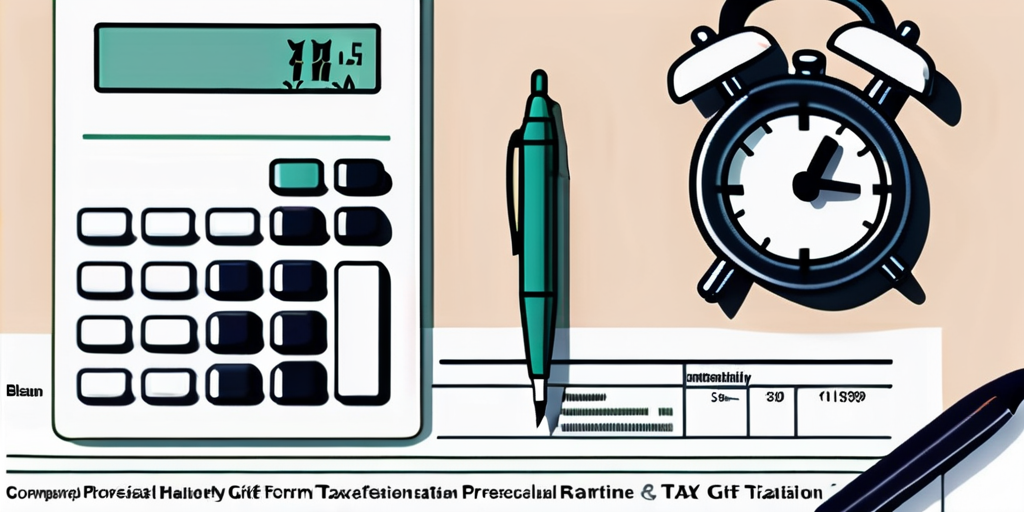Welcome, dear reader, to the world of gift tax! A world filled with joy, generosity, and, well, taxes. But fear not, for this guide will illuminate the path through the labyrinth of tax planning. So, buckle up, grab your calculator, and let’s dive into the riveting world of gift tax planning!
Now, you might be wondering, “Why on earth do I need to pay taxes on gifts?” Well, my friend, the taxman cometh for us all, even when we’re trying to be generous. But don’t worry, this guide will help you navigate the murky waters of gift tax and hopefully save you a few pennies along the way.
Understanding Gift Tax
Before we start planning, we need to understand what we’re dealing with. Gift tax, in its simplest form, is a tax on the transfer of wealth. If you give someone a gift and it exceeds a certain value, you might have to pay tax on it. It’s like a toll booth on the highway of generosity.
But don’t panic just yet! There are exemptions and thresholds in place that can protect your hard-earned money from the taxman’s greedy hands. So, let’s break it down and see how it all works.
The Annual Exclusion
First up is the annual exclusion. This is the amount you can give each year to any number of individuals without incurring any gift tax. It’s like a free pass to be generous, so make the most of it!
Now, the exact amount can change from year to year, so it’s always a good idea to check with a tax professional or do a quick internet search to find the current limit. But remember, this is per recipient, so if you’re feeling particularly generous, you can give multiple gifts up to the limit to multiple people.
The Lifetime Exemption
Next up is the lifetime exemption. This is the total amount you can give away during your lifetime without incurring gift tax. It’s a bit like a lifetime supply of free passes to the generosity fair.
Again, the exact amount can change from year to year, so it’s always a good idea to check the current limit. But remember, this is a lifetime limit, so once you’ve used it up, that’s it. No more free passes.
Gift Tax Planning Strategies
Now that we’ve got the basics down, let’s look at some strategies for managing your gift tax. After all, the goal here is to be as generous as possible without giving away your hard-earned money to the taxman.
So, let’s look at some strategies that can help you do just that. From timing your gifts to using trusts, there are plenty of ways to maximize your generosity while minimizing your tax liability.
Timing Your Gifts
One of the simplest strategies is to time your gifts. By spreading your gifts out over several years, you can take full advantage of the annual exclusion and avoid paying gift tax.
For example, if you want to give a large gift, you could spread it out over several years, giving the maximum amount allowed under the annual exclusion each year. This way, you can give a large gift without incurring any gift tax.
Using Trusts
Another strategy is to use trusts. A trust is a legal arrangement where you give control of your assets to a trustee for the benefit of a third party. It’s like putting your money in a safe and giving someone else the key.
There are many types of trusts, each with their own tax implications, so it’s a good idea to consult with a tax professional before setting one up. But with the right planning, a trust can be a powerful tool for managing your gift tax.
Gift Tax Reporting
Now, let’s talk about reporting. If you give a gift that’s above the annual exclusion, you’ll need to report it to the IRS. It’s like telling the teacher you ate an extra cookie at lunchtime.

But don’t worry, reporting a gift doesn’t necessarily mean you’ll have to pay tax on it. Remember, you have a lifetime exemption that you can use. So, let’s look at how to report a gift.
Filing a Gift Tax Return
If you give a gift above the annual exclusion, you’ll need to file a gift tax return. This is a separate form that you’ll need to fill out and send to the IRS.
Now, filling out a tax form might sound like a nightmare, but don’t worry, it’s not as bad as it sounds. The form is relatively straightforward, and there are plenty of resources available to help you fill it out correctly.
Using Your Lifetime Exemption
If you give a gift above the annual exclusion, you can use your lifetime exemption to avoid paying tax on it. It’s like using a get-out-of-jail-free card in Monopoly.
But remember, once you’ve used up your lifetime exemption, that’s it. So, it’s a good idea to keep track of your gifts and plan accordingly to make the most of your exemption.
Conclusion
And there you have it, a comprehensive guide to gift tax planning. From understanding the basics to implementing strategies, we’ve covered it all. So, go forth and be generous, my friend, but remember, the taxman cometh, so plan accordingly!
Remember, tax planning is a complex field, and this guide is just the tip of the iceberg. So, if you’re unsure about anything, it’s always a good idea to consult with a tax professional. After all, it’s better to be safe than sorry when it comes to taxes.


